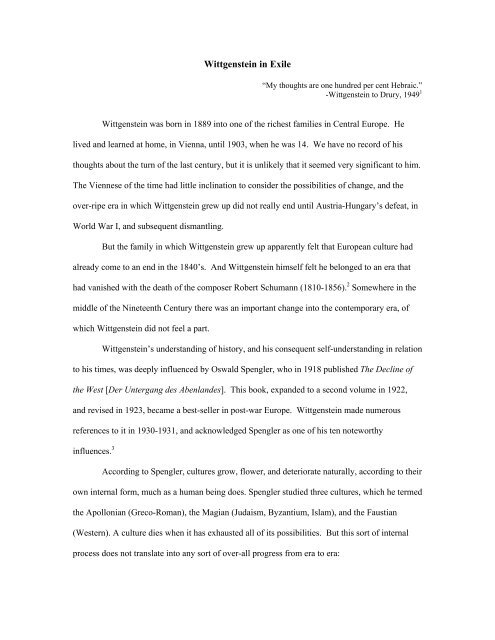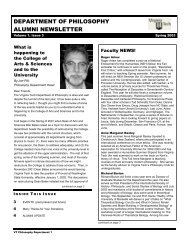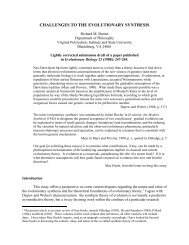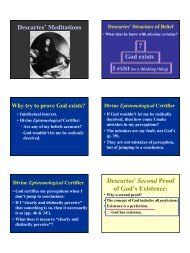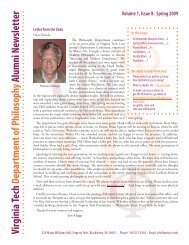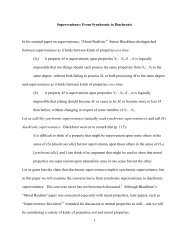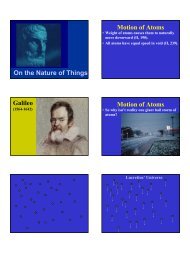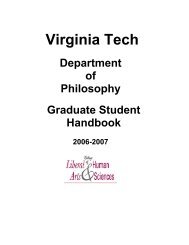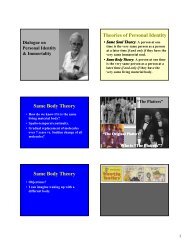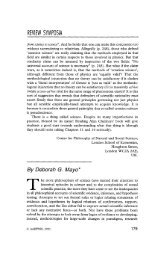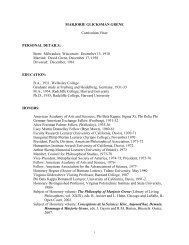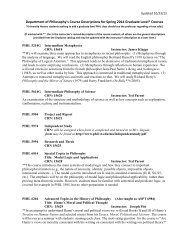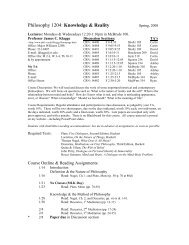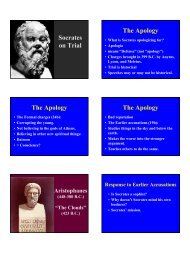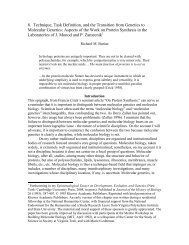Wittgenstein in Exile
Wittgenstein in Exile
Wittgenstein in Exile
Create successful ePaper yourself
Turn your PDF publications into a flip-book with our unique Google optimized e-Paper software.
<strong>Wittgenste<strong>in</strong></strong> <strong>in</strong> <strong>Exile</strong><br />
“My thoughts are one hundred per cent Hebraic.”<br />
-<strong>Wittgenste<strong>in</strong></strong> to Drury, 1949 1<br />
<strong>Wittgenste<strong>in</strong></strong> was born <strong>in</strong> 1889 <strong>in</strong>to one of the richest families <strong>in</strong> Central Europe. He<br />
lived and learned at home, <strong>in</strong> Vienna, until 1903, when he was 14. We have no record of his<br />
thoughts about the turn of the last century, but it is unlikely that it seemed very significant to him.<br />
The Viennese of the time had little <strong>in</strong>cl<strong>in</strong>ation to consider the possibilities of change, and the<br />
over-ripe era <strong>in</strong> which <strong>Wittgenste<strong>in</strong></strong> grew up did not really end until Austria-Hungary’s defeat, <strong>in</strong><br />
World War I, and subsequent dismantl<strong>in</strong>g.<br />
But the family <strong>in</strong> which <strong>Wittgenste<strong>in</strong></strong> grew up apparently felt that European culture had<br />
already come to an end <strong>in</strong> the 1840’s. And <strong>Wittgenste<strong>in</strong></strong> himself felt he belonged to an era that<br />
had vanished with the death of the composer Robert Schumann (1810-1856). 2 Somewhere <strong>in</strong> the<br />
middle of the N<strong>in</strong>eteenth Century there was an important change <strong>in</strong>to the contemporary era, of<br />
which <strong>Wittgenste<strong>in</strong></strong> did not feel a part.<br />
<strong>Wittgenste<strong>in</strong></strong>’s understand<strong>in</strong>g of history, and his consequent self-understand<strong>in</strong>g <strong>in</strong> relation<br />
to his times, was deeply <strong>in</strong>fluenced by Oswald Spengler, who <strong>in</strong> 1918 published The Decl<strong>in</strong>e of<br />
the West [Der Untergang des Abenlandes]. This book, expanded to a second volume <strong>in</strong> 1922,<br />
and revised <strong>in</strong> 1923, became a best-seller <strong>in</strong> post-war Europe. <strong>Wittgenste<strong>in</strong></strong> made numerous<br />
references to it <strong>in</strong> 1930-1931, and acknowledged Spengler as one of his ten noteworthy<br />
<strong>in</strong>fluences. 3<br />
Accord<strong>in</strong>g to Spengler, cultures grow, flower, and deteriorate naturally, accord<strong>in</strong>g to their<br />
own <strong>in</strong>ternal form, much as a human be<strong>in</strong>g does. Spengler studied three cultures, which he termed<br />
the Apollonian (Greco-Roman), the Magian (Judaism, Byzantium, Islam), and the Faustian<br />
(Western). A culture dies when it has exhausted all of its possibilities. But this sort of <strong>in</strong>ternal<br />
process does not translate <strong>in</strong>to any sort of over-all progress from era to era:
…the 19 th and 20 th centuries, hitherto looked on as the highest po<strong>in</strong>t of an ascend<strong>in</strong>g straight l<strong>in</strong>e<br />
of world-history, are <strong>in</strong> reality a stage of life which may be observed <strong>in</strong> every Culture that has<br />
ripened to its limit….The future of the West is not a limitless tend<strong>in</strong>g upwards and onwards for all<br />
time towards our present ideals, but a s<strong>in</strong>gle phenomenon of history, strictly limited as to form and<br />
duration, which covers a few centuries… 4<br />
Our own Western era is supposed to have begun around 1000 with the soar<strong>in</strong>g vaults and<br />
spires of Romanesque and Gothic cathedrals, reached maturity <strong>in</strong> the Baroque period of Bach,<br />
begun to decl<strong>in</strong>e with the Rococo ref<strong>in</strong>ements and dar<strong>in</strong>g philosophical speculation of the<br />
Eighteenth and N<strong>in</strong>eteenth Centuries, and plunged <strong>in</strong>to deterioration <strong>in</strong> the N<strong>in</strong>eteenth and<br />
Twentieth Centuries. The maturity of an era, which Spengler called “culture” [Kultur], was<br />
equated with organism and religion. The end of an era, which Spengler called “civilization”<br />
[Zivilisation], was equated with mechanism and irreligion. Spengler writes:<br />
For every Culture has its own Civilization….The Civilization is the <strong>in</strong>evitable dest<strong>in</strong>y of the<br />
Culture….Civilizations are the most external and artificial states of which a species of developed<br />
humanity is capable. They are a conclusion, the th<strong>in</strong>g-become succeed<strong>in</strong>g the th<strong>in</strong>g-becom<strong>in</strong>g,<br />
death follow<strong>in</strong>g life, rigidity follow<strong>in</strong>g expansion….The transition from Culture to Civilization<br />
was accomplished for the Classical world <strong>in</strong> the fourth, for the Western <strong>in</strong> the n<strong>in</strong>eteenth century. 5<br />
This period of deterioration, both <strong>in</strong> the Roman Empire and <strong>in</strong> the modern West, Spengler saw as<br />
characterized by eclectic art, desiccated thought, politics as a façade for the power of money,<br />
mobs of people liv<strong>in</strong>g <strong>in</strong> large cities, and unend<strong>in</strong>g warfare.<br />
This contrast between culture and civilization was fundamental to <strong>Wittgenste<strong>in</strong></strong>’s<br />
understand<strong>in</strong>g of his own times. <strong>Wittgenste<strong>in</strong></strong> articulated this contrast most clearly <strong>in</strong> a draft he<br />
wrote for a foreword to a manuscript on which he was work<strong>in</strong>g <strong>in</strong> 1930:<br />
This book is written for those who are <strong>in</strong> sympathy with the spirit <strong>in</strong> which it is written. This is<br />
not, I believe, the spirit of the ma<strong>in</strong> current of European and American civilization. The spirit of<br />
this civilization makes itself manifest <strong>in</strong> the <strong>in</strong>dustry, architecture and music of our time, <strong>in</strong> its<br />
fascism and socialism, and it is alien and uncongenial to the author. This is not a value judgement.<br />
2
It is not, it is true, as though he accepted what nowadays passes for architecture as architecture or<br />
did not approach what is called modern music with the greatest suspicion (though without<br />
understand<strong>in</strong>g its language), but still, the disappearance of the arts does not justify judg<strong>in</strong>g<br />
disparag<strong>in</strong>gly the human be<strong>in</strong>gs who make up this civilization….<br />
I realize then that the disappearance of a culture does not signify the disappearance of<br />
human value, but simply of certa<strong>in</strong> means of express<strong>in</strong>g this value, yet the fact rema<strong>in</strong>s that I have<br />
no sympathy for the current of European civilization and do not understand its goals, if it has any. 6<br />
Clearly <strong>Wittgenste<strong>in</strong></strong> saw the era up through Schumann as the flower<strong>in</strong>g of Western culture, and<br />
the time s<strong>in</strong>ce, his and our own time, as deteriorat<strong>in</strong>g Western civilization. This accounts for the<br />
numerous disparag<strong>in</strong>g remarks <strong>Wittgenste<strong>in</strong></strong> made about modern arts. 7<br />
Indeed, the orig<strong>in</strong>al title<br />
of this symposium, “<strong>Wittgenste<strong>in</strong></strong> and Culture,” is mislead<strong>in</strong>g, s<strong>in</strong>ce <strong>Wittgenste<strong>in</strong></strong> did not believe<br />
that we or he had a culture. Spengler writes:<br />
The present is a civilized, emphatically not a cultured time, and ipso facto a great number of lifecapacities<br />
fall out as impossible….We are a civilized, not Gothic or Rococo, people; we have to<br />
reckon with the hard cold facts of a late life, to which the parallel is to be found not <strong>in</strong> Pericles’<br />
Athens but <strong>in</strong> Caesar’s Rome. Of great pa<strong>in</strong>t<strong>in</strong>g or great music there can no longer be, for<br />
Western people, any question. Their architectural possibilities have been exhausted these hundred<br />
years. Only extensive possibilities are left to them. 8<br />
S<strong>in</strong>ce <strong>Wittgenste<strong>in</strong></strong> identified with and felt grounded <strong>in</strong> this lost culture, he commonly<br />
expressed the feel<strong>in</strong>g that few—the remnant—would understand him. He concluded the early<br />
draft of his foreword (1930) with:<br />
So I am really writ<strong>in</strong>g for friends who are scattered throughout the corners of the globe.<br />
Reflect<strong>in</strong>g on this statement <strong>in</strong> 1931, <strong>Wittgenste<strong>in</strong></strong> writes:<br />
If I say that my book is meant for only a small circle of people (if it can be called a circle), I do not<br />
mean that I believe this circle to be the elite of mank<strong>in</strong>d; but it does comprise those to whom I turn<br />
(not because they are better or worse than others but) because they form my cultural milieu, my<br />
fellow citizens as it were, <strong>in</strong> contrast to the rest who are foreign to me. 9<br />
3
And <strong>in</strong> the Preface to his Philosophical Investigations, written <strong>in</strong> 1945, he says:<br />
It is not impossible that it should fall to the lot of this work, <strong>in</strong> its poverty, and <strong>in</strong> the darkness of<br />
this time, to br<strong>in</strong>g light <strong>in</strong>to one bra<strong>in</strong> or another—but, of course, it is not likely.<br />
In effect <strong>Wittgenste<strong>in</strong></strong> was an exile—not from his home-place so much as from his home-time, his<br />
cultural home. 10<br />
What is one to do as an exile? The Northern K<strong>in</strong>gdom of the Israelites accepted<br />
assimilation <strong>in</strong> Babylonia, as do most exiles, and disappeared from the history books. The<br />
Southern K<strong>in</strong>gdom of the Judaeans sought to reta<strong>in</strong> their identity <strong>in</strong> exile. Some of them “wept<br />
by the rivers of Babylon,” 11 while Isaiah prophesied “a voice cry<strong>in</strong>g <strong>in</strong> the wilderness.” 12<br />
This is<br />
a problem with which <strong>Wittgenste<strong>in</strong></strong> constantly struggled.<br />
Spengler was ready with advice:<br />
[This] is a time of decl<strong>in</strong>e. True. But we have not chosen this time. We cannot help it if we are<br />
born as men of the early w<strong>in</strong>ter of full Civilization, <strong>in</strong>stead of on the golden summit of a ripe<br />
Culture. Everyth<strong>in</strong>g depends on our see<strong>in</strong>g our own position, our dest<strong>in</strong>y, clearly, on our realiz<strong>in</strong>g<br />
that though we may lie to ourselves about it we cannot evade it. He who does not acknowledge<br />
this <strong>in</strong> his heart, ceases to be counted among the men of his generation, and rema<strong>in</strong>s either a<br />
simpleton, a charlatan, or a pedant. … One must beg<strong>in</strong> by ask<strong>in</strong>g oneself…what today is possible<br />
and what he must forbid himself. 13<br />
<strong>Wittgenste<strong>in</strong></strong> took this advice to heart <strong>in</strong> the draft foreword cited earlier:<br />
For <strong>in</strong> times like these, genu<strong>in</strong>e strong characters simply leave the arts aside and turn to other<br />
th<strong>in</strong>gs and somehow the worth of the <strong>in</strong>dividual man f<strong>in</strong>ds expression. Not, to be sure, <strong>in</strong> the way<br />
it would at a time of high culture. A culture is like a big organization which assigns each of its<br />
members a place where he can work <strong>in</strong> the spirit of the whole; and it is perfectly fair for his power<br />
to be measured by the contribution he succeeds <strong>in</strong> mak<strong>in</strong>g to the whole enterprise. In an age<br />
without culture on the other hand forces become fragmented and the power of an <strong>in</strong>dividual man is<br />
used up <strong>in</strong> overcom<strong>in</strong>g oppos<strong>in</strong>g forces and frictional resistances; it does not show <strong>in</strong> the distance<br />
he travels but perhaps only <strong>in</strong> the heat he generates <strong>in</strong> overcom<strong>in</strong>g friction. But energy is still<br />
4
energy and even if the spectacle which our age affords us is not the formation of a great cultural<br />
work, with the best men contribut<strong>in</strong>g to the same great end, so much as the unimpressive spectacle<br />
of a crowd whose best members work for purely private ends, still we must not forget that the<br />
spectacle is not what matters…<br />
And he goes on to write:<br />
It is all one to me whether or not the typical western scientist understands or appreciates my work,<br />
s<strong>in</strong>ce he will not <strong>in</strong> any case understand the spirit <strong>in</strong> which I write.<br />
Our civilization is characterized by the word ‘progress’. Progress <strong>in</strong> its form rather than<br />
mak<strong>in</strong>g progress be<strong>in</strong>g one of its features. Typically it constructs. It is occupied with build<strong>in</strong>g an<br />
ever more complicated structure. And even clarity is sought only as a means to this end, not as an<br />
end <strong>in</strong> itself.<br />
For me on the contrary clarity, perspicuity are valuable <strong>in</strong> themselves.<br />
I am not <strong>in</strong>terested <strong>in</strong> construct<strong>in</strong>g a build<strong>in</strong>g, so much as <strong>in</strong> hav<strong>in</strong>g a perspicuous view of<br />
the foundations of possible build<strong>in</strong>gs.<br />
So I am not aim<strong>in</strong>g at the same target as the scientists and my way of th<strong>in</strong>k<strong>in</strong>g is different<br />
from theirs. 14<br />
Much of <strong>Wittgenste<strong>in</strong></strong>’s later work was an attempt to change people’s th<strong>in</strong>k<strong>in</strong>g, especially what<br />
he took to be their tendency to an idolatry of science. This is explicit <strong>in</strong> the 1938 lectures on<br />
aesthetics, where <strong>Wittgenste<strong>in</strong></strong> claims to be mak<strong>in</strong>g propaganda for his style of th<strong>in</strong>k<strong>in</strong>g, and<br />
persuad<strong>in</strong>g his students aga<strong>in</strong>st the “idol worship” of science. 15<br />
Indeed, <strong>Wittgenste<strong>in</strong></strong> saw this as<br />
an <strong>in</strong>stance of his philosophical method: “All that philosophy can do is to destroy idols.” 16<br />
Though he also saw that such changes might be more a matter of chang<strong>in</strong>g the style of life than of<br />
chang<strong>in</strong>g just the style of thought. 17<br />
But what did <strong>Wittgenste<strong>in</strong></strong> th<strong>in</strong>k that he could accomplish, as the prophet <strong>in</strong> exile,<br />
preach<strong>in</strong>g aga<strong>in</strong>st the idols? <strong>Wittgenste<strong>in</strong></strong> had no illusions about the difficulty of his task:<br />
Put a man <strong>in</strong> the wrong atmosphere and noth<strong>in</strong>g will function as it should. He will seem unhealthy<br />
<strong>in</strong> every part. Put him back <strong>in</strong>to his proper element and everyth<strong>in</strong>g will blossom and look healthy.<br />
5
But if he is not <strong>in</strong> his right element, what then? Well, then he just has to make the best of<br />
appear<strong>in</strong>g before the world as a cripple. 18<br />
Could we return to the culture of a by-gone era? If anyth<strong>in</strong>g <strong>Wittgenste<strong>in</strong></strong> seemed to<br />
suppose that his thoughts might have value for a future culture. In 1949 he said to Drury:<br />
My th<strong>in</strong>k<strong>in</strong>g is not wanted <strong>in</strong> this present age, I have to swim so strongly aga<strong>in</strong>st the tide. Perhaps<br />
<strong>in</strong> a hundred years people will really want what I am writ<strong>in</strong>g. 19<br />
But perhaps some genu<strong>in</strong>e or <strong>in</strong>cipient culture existed <strong>in</strong> the present, only not <strong>in</strong> the<br />
West. It is with this thought that <strong>Wittgenste<strong>in</strong></strong> may have looked to Russia. Spengler clearly<br />
viewed Russia as the embryo of a new culture, and considered Dostoyevsky to be its prophet. 20<br />
It<br />
has never been clear exactly why <strong>Wittgenste<strong>in</strong></strong> was attracted to the idea of mov<strong>in</strong>g to Russia, 21 but<br />
it is by now hard to avoid the thought that it was, for him, a possible return from exile. Just as<br />
Palest<strong>in</strong>e was the Zionist goal of Jews <strong>in</strong> Diaspora, Russia could have seemed to be the homeland<br />
for the exile <strong>Wittgenste<strong>in</strong></strong>. 22<br />
<strong>Wittgenste<strong>in</strong></strong> took Russian lessons beg<strong>in</strong>n<strong>in</strong>g <strong>in</strong> 1934, and visited Russia for some two<br />
weeks <strong>in</strong> September, 1935, <strong>in</strong> search of permanent work there. Though th<strong>in</strong>gs did not go well,<br />
and presumably <strong>Wittgenste<strong>in</strong></strong> did not f<strong>in</strong>d what he thought he might, he was still contemplat<strong>in</strong>g a<br />
move as late as 1937. 23<br />
Perhaps he had trouble believ<strong>in</strong>g that Dostoyevsky’s Russia—the Home-<br />
Culture and promised land--did not really exist for him. Indeed, the homeland is rarely what it<br />
seems from abroad. 24 In any case, <strong>Wittgenste<strong>in</strong></strong> lived out his years <strong>in</strong> exile. 25<br />
While <strong>Wittgenste<strong>in</strong></strong> admired much <strong>in</strong> the lost culture of the West, there were few aspects<br />
of his contemporary “culture” that <strong>in</strong>terested him: some movies, especially American musicals<br />
and westerns with happy end<strong>in</strong>gs, detective stories, m<strong>in</strong>imalist architecture, basically just<br />
amusements and the th<strong>in</strong>gs one needed to get by—wholly without pretension. Indeed,<br />
<strong>Wittgenste<strong>in</strong></strong> tolerated little but the light baggage of an exile, wait<strong>in</strong>g for someth<strong>in</strong>g—the return<br />
ticket home—that he never found.<br />
6
See<strong>in</strong>g <strong>Wittgenste<strong>in</strong></strong> as an <strong>Exile</strong><br />
<strong>Wittgenste<strong>in</strong></strong>’s extensive discussion of “see<strong>in</strong>g as” <strong>in</strong> Section XI of Part II of the<br />
Philosophical Investigations seems pert<strong>in</strong>ent to our discussion. In particular, we have been<br />
“notic<strong>in</strong>g an aspect” (p. 193/p. 165 <strong>in</strong> 3 rd edition) of <strong>Wittgenste<strong>in</strong></strong>’s life. How we see<br />
<strong>Wittgenste<strong>in</strong></strong>’s life depends <strong>in</strong> part on what surround<strong>in</strong>gs we choose to emphasize. I have tried to<br />
arrange pieces of his life <strong>in</strong> such a way that it is natural to see similarities to the Hebrew concept<br />
of an exile. I have been helped <strong>in</strong> this by Spenglerian ideas that <strong>Wittgenste<strong>in</strong></strong> took seriously.<br />
<strong>Wittgenste<strong>in</strong></strong> exhibits many of the characteristics of an exile: He lives outside his own culture<br />
<strong>in</strong>voluntarily; he is alienated from his surround<strong>in</strong>gs; and he feels himself to be a voice cry<strong>in</strong>g <strong>in</strong><br />
the wilderness, preach<strong>in</strong>g to the faithful remnant, <strong>in</strong>veigh<strong>in</strong>g aga<strong>in</strong>st the idols. Not only does he<br />
exhibit these characteristics, but he uses the term “exile” (as well as “exiliert” and “Verbannung”<br />
<strong>in</strong> German) <strong>in</strong> describ<strong>in</strong>g himself.<br />
Once we see <strong>Wittgenste<strong>in</strong></strong> as an exile, I th<strong>in</strong>k this enables us to better understand some<br />
th<strong>in</strong>gs about his life and thought. It provides a motivation for his <strong>in</strong>terest <strong>in</strong> liv<strong>in</strong>g <strong>in</strong> Russia—a<br />
possible homeland for him. I th<strong>in</strong>k it also helps us to better understand his conception of the<br />
philosopher and the role of philosophy. And, I th<strong>in</strong>k it helps us to better understand his<br />
ambivalence about religion <strong>in</strong> his own life. To these latter issues I now turn.<br />
<strong>Exile</strong> and the Philosopher<br />
As far as I can tell, <strong>Wittgenste<strong>in</strong></strong>’s own th<strong>in</strong>k<strong>in</strong>g about philosophy and philosophers is not<br />
<strong>in</strong> any way <strong>in</strong>fluenced by Spengler’s ideas about philosophy. Spengler sees philosophy as<br />
embody<strong>in</strong>g the ideology of an age, and <strong>in</strong> particular, a mechanistic philosophy will be<br />
characteristic of a civilization of the sort <strong>in</strong> which we now live. 26<br />
But the notion of an exile, as<br />
generated by Spengler’s conceptual-historical scheme, is useful for th<strong>in</strong>k<strong>in</strong>g about <strong>Wittgenste<strong>in</strong></strong>’s<br />
conception of the philosopher.<br />
7
To what extent did <strong>Wittgenste<strong>in</strong></strong>’s role as an exile fit him to be a philosopher? His<br />
comments about philosophy and the nature of philosophy are quite various, but some of them<br />
resonate well with the metaphor of exile.<br />
<strong>Wittgenste<strong>in</strong></strong> wrote <strong>in</strong> 1931:<br />
(The philosopher is not a citizen of any community of ideas. That is what makes him a<br />
philosopher.) 27<br />
This makes it sound as though exile is an appropriate status for a philosopher, discomfort<strong>in</strong>g<br />
though it may be. Perhaps the separation from a community is what allows the philosopher to<br />
ga<strong>in</strong> the sort of synoptic overview of language necessary to see its ditches.<br />
In 1945 <strong>Wittgenste<strong>in</strong></strong> warned his friend Rush Rhees away from jo<strong>in</strong><strong>in</strong>g the Revolutionary<br />
Communist (Trotskyist) Party because of the conformity it would require:<br />
Whereas <strong>in</strong> do<strong>in</strong>g philosophy you have got to be ready constantly to change the direction <strong>in</strong> which<br />
you are mov<strong>in</strong>g….You must be able to give up those central notions which have seemed to be<br />
what you must keep if you are to th<strong>in</strong>k at all….And if you are th<strong>in</strong>k<strong>in</strong>g as a philosopher you<br />
cannot treat the ideas of communism differently from others. 28<br />
In 1931 <strong>Wittgenste<strong>in</strong></strong> had characterized the logician Frank Ramsey as a “bourgeois th<strong>in</strong>ker”:<br />
I.e., he thought with the aim of clear<strong>in</strong>g up the affairs of some particular community….The idea<br />
that this state might not be the only possible one <strong>in</strong> part disquieted him and <strong>in</strong> part bored him. He<br />
wanted to get down, as quickly as possible to reflect<strong>in</strong>g on the foundations—of this state. This<br />
was what he was good at and what really <strong>in</strong>terested him; whereas real philosophical reflection<br />
disturbed him until he put its result (if it had one) to one side and declared it trivial. 29<br />
Spell<strong>in</strong>g out the implications of this <strong>in</strong> 1944, <strong>Wittgenste<strong>in</strong></strong> shocked Rhees by declar<strong>in</strong>g that Georg<br />
Kreisel was the most able philosopher he had met who was also a mathematician. “More able<br />
than Ramsey?” Rhees asked. “Ramsey?!” replied <strong>Wittgenste<strong>in</strong></strong>. “Ramsey was a<br />
mathematician!” 30<br />
Presumably Ramsey was unable to ma<strong>in</strong>ta<strong>in</strong> a sufficient distance from<br />
mathematics to be a good philosopher.<br />
8
<strong>Wittgenste<strong>in</strong></strong> also used geographical imagery <strong>in</strong> his discussions of philosophy: “A<br />
philosophical problem has the form: ‘I don’t know my way about’.” 31<br />
He sometimes compared<br />
himself to a tour guide:<br />
I am try<strong>in</strong>g to conduct you on tours <strong>in</strong> a certa<strong>in</strong> country. I will try to show that the philosophical<br />
difficulties which arise <strong>in</strong> mathematics as elsewhere arise because we f<strong>in</strong>d ourselves <strong>in</strong> a strange<br />
town and do not know our way. So we must learn the topography by go<strong>in</strong>g from one place <strong>in</strong> the<br />
town to another, and from there to another, and so on. And one must do this so often that one<br />
knows one’s way, either immediately or pretty soon after look<strong>in</strong>g around a bit, wherever one may<br />
be set down….This is an extremely good simile….The difficulty of philosophy is to f<strong>in</strong>d one’s<br />
way about. 32<br />
This tour-guide metaphor fits well with the notion of exile: A philosopher has to be ready to be a<br />
guide for any part of the city. One who is too deeply immersed <strong>in</strong> a s<strong>in</strong>gle part of the city cannot<br />
play this role. Thus one cannot be a resident of any particular neighborhood, but must be able to<br />
rise above that, as Ramsey had not. Thus, be<strong>in</strong>g an exile is an asset so far as philosophy is<br />
concerned. 33<br />
From this perspective it is especially ironic that when <strong>Wittgenste<strong>in</strong></strong> sought employment <strong>in</strong><br />
Russia, dur<strong>in</strong>g his visit <strong>in</strong> 1935, whereas he had hoped for work as a doctor or as a laborer, the<br />
only th<strong>in</strong>g he was offered was work as a philosopher—as lecturer at the University of Moscow, or<br />
professor at Kazan University. 34<br />
It was presumably the very th<strong>in</strong>g <strong>in</strong> which success could be<br />
impeded by a flight from exile.<br />
Philosophy, Culture and Civilization<br />
In addition to comments on the role of the philosopher, <strong>Wittgenste<strong>in</strong></strong> also reflects on the<br />
nature of philosophical problems. In keep<strong>in</strong>g with the imagery of language as an ancient city, and<br />
the philosopher as a tour guide who can atta<strong>in</strong> and convey a synoptic view of the layout,<br />
<strong>Wittgenste<strong>in</strong></strong> suggests that philosophical problems are <strong>in</strong>herent <strong>in</strong> our language—they come with<br />
9
the territory. And by “our” language he not only means his language, but seem<strong>in</strong>gly all language,<br />
or at least the languages of the Western tradition. This, he expla<strong>in</strong>s, is why there is no “progress”<br />
<strong>in</strong> philosophy, even s<strong>in</strong>ce the time of the Greeks:<br />
It is because our language has rema<strong>in</strong>ed the same and keeps seduc<strong>in</strong>g us <strong>in</strong>to ask<strong>in</strong>g the same<br />
questions. As long as there cont<strong>in</strong>ues to be a verb ‘to be’ that looks as if it functions <strong>in</strong> the same<br />
way as ‘to eat’ and ‘to dr<strong>in</strong>k’, as long as we still have the adjectives ‘identical’, ‘true’, ‘false’,<br />
‘possible’, as long as we cont<strong>in</strong>ue to talk of a river of time, of an expanse of space, etc. etc., people<br />
will keep stumbl<strong>in</strong>g over the same puzzl<strong>in</strong>g difficulties and f<strong>in</strong>d themselves star<strong>in</strong>g at someth<strong>in</strong>g<br />
which no explanation seems capable of clear<strong>in</strong>g up. 35<br />
At other po<strong>in</strong>ts <strong>Wittgenste<strong>in</strong></strong> describes the problems as deriv<strong>in</strong>g from a mythology “laid down <strong>in</strong><br />
our language.” 36<br />
One should address them <strong>in</strong> a calm and bus<strong>in</strong>ess-like manner, but the process<br />
“doesn’t have an end”. 37<br />
To follow out the metaphor of the ancient city, the streets and ditches<br />
are where they are—no urban renewal is <strong>in</strong> prospect. The job of a tour-guide is never done,<br />
because there are always new people who need the tour; 38 or, perhaps the tour just never s<strong>in</strong>ks <strong>in</strong>:<br />
A philosopher says “Look at th<strong>in</strong>gs like this!”—but <strong>in</strong> the first place that doesn’t ensure that<br />
people will look at th<strong>in</strong>gs like that, and <strong>in</strong> the second place his admonition may come altogether<br />
too late; it’s possible, moreover, that such an admonition can achieve noth<strong>in</strong>g <strong>in</strong> any case and that<br />
the impetus for such a change <strong>in</strong> the ways th<strong>in</strong>gs are perceived has to orig<strong>in</strong>ate somewhere else<br />
entirely. 39<br />
<strong>Wittgenste<strong>in</strong></strong> sometimes talks as though there are th<strong>in</strong>gs that could happen that would<br />
f<strong>in</strong>ish the need for philosophy:<br />
I am by no means sure that I should prefer a cont<strong>in</strong>uation of my work by others to a change <strong>in</strong> the<br />
way people live which would make all these questions superfluous. 40<br />
And, <strong>in</strong>deed, this view seems possible from the larger perspective of <strong>Wittgenste<strong>in</strong></strong>’s thought,<br />
s<strong>in</strong>ce language is not a frozen and isolated entity. Language is a part of life, and <strong>in</strong>sofar as life<br />
changes, language and mean<strong>in</strong>g change too.<br />
10
From this perspective it seems at least possible that the evolution from culture to<br />
civilization, or the move from one tradition to another could well affect the role of, or need for,<br />
philosophy. Though there is noth<strong>in</strong>g <strong>in</strong> <strong>Wittgenste<strong>in</strong></strong>’s or Spengler’s comments about culture and<br />
civilization to suggest that one of these is less <strong>in</strong> need of philosophy, the variability of these sorts<br />
of epochs makes it quite unlikely that an a priori case could be made for the <strong>in</strong>evitable need for<br />
philosophy. 41<br />
Still, short of (what would seem to us to be) significant mental deterioration, it is<br />
hard to imag<strong>in</strong>e what changes “would make all these questions superfluous.” 42<br />
Religion and <strong>Exile</strong><br />
Spengler’s account of religion is not all that different from his account of philosophy.<br />
Both embody the ideology of an era. However, <strong>in</strong> the case of religion, <strong>Wittgenste<strong>in</strong></strong> is not so<br />
anxious to dissent.<br />
For <strong>Wittgenste<strong>in</strong></strong>, philosophy is an activity sui generis. One who is separated from the<br />
community is well-suited to engag<strong>in</strong>g <strong>in</strong> philosophy. Religion, however, is not, <strong>in</strong> this way,<br />
someth<strong>in</strong>g wholly separate. Or rather, religion has two aspects, the <strong>in</strong>ner aspect—one’s spiritual<br />
relationship to God—and the outer aspect—one’s participation <strong>in</strong> ceremony, obedience and<br />
lov<strong>in</strong>g behavior. Not surpris<strong>in</strong>gly, <strong>Wittgenste<strong>in</strong></strong>’s engagement with religion consisted almost<br />
entirely of the former. The latter was lost on, or more difficult for, an exile without a community.<br />
Thus, I believe, we get <strong>Wittgenste<strong>in</strong></strong>’s ambiguous attitude towards religion <strong>in</strong> his own life.<br />
Of course, <strong>Wittgenste<strong>in</strong></strong> was ambivalent about be<strong>in</strong>g a philosopher, too. But it was not<br />
ambivalence about whether he could be a philosopher, or be a good one, but about whether he<br />
should be a philosopher at all. His ambivalence concern<strong>in</strong>g religion was whether he could be<br />
religious. 43<br />
He certa<strong>in</strong>ly thought he should be religious, and he wanted to be religious. While he<br />
wished for the discovery that could allow him to stop do<strong>in</strong>g philosophy when he wanted to (PI<br />
133), he never sought the discovery that would allow him to stop try<strong>in</strong>g to be religious. It was<br />
someth<strong>in</strong>g that he wanted, and worked at obsessively <strong>in</strong> certa<strong>in</strong> respects, but was unable to accept<br />
11
<strong>in</strong> the forms <strong>in</strong> which it existed <strong>in</strong> the civilization <strong>in</strong> which he lived. Ironically, religion may have<br />
been the very th<strong>in</strong>g that could have stopped him th<strong>in</strong>k<strong>in</strong>g, and hence allowed him to stop do<strong>in</strong>g<br />
philosophy. As Russell wrote to Ottol<strong>in</strong>e, concern<strong>in</strong>g his meet<strong>in</strong>g with <strong>Wittgenste<strong>in</strong></strong> after World<br />
War I:<br />
He has penetrated deep <strong>in</strong>to mystical ways of thought and feel<strong>in</strong>g, but I th<strong>in</strong>k (though he wouldn’t<br />
agree) that what he likes best <strong>in</strong> mysticism is its power to make him stop th<strong>in</strong>k<strong>in</strong>g. 44<br />
Whether <strong>Wittgenste<strong>in</strong></strong> could have been (comfortably) religious <strong>in</strong> a culture to his lik<strong>in</strong>g,<br />
say <strong>in</strong> Dostoyevsky’s Russia, rema<strong>in</strong>s, <strong>in</strong> my m<strong>in</strong>d, an open question. Religion, then, was not the<br />
salvation of the exile, as it had been, for <strong>in</strong>stance, for the Hebrews, but <strong>in</strong> this case the frustration<br />
of the exile, <strong>Wittgenste<strong>in</strong></strong>. 45<br />
James C. Klagge<br />
Virg<strong>in</strong>ia Polytechnic Institute and State University<br />
1 M. O’C. Drury, “Conversations with <strong>Wittgenste<strong>in</strong></strong>,” <strong>in</strong> Recollections of <strong>Wittgenste<strong>in</strong></strong>, ed. R. Rhees, New<br />
York: Oxford University Press, revised edition, 1984, p. 161.<br />
2 See Brian McGu<strong>in</strong>ness, <strong>Wittgenste<strong>in</strong></strong>: A Life, Young Ludwig (1889-1921), Berkeley and Los Angeles:<br />
University of California Press, 1988, pp. 3 and 8; and also Ludwig <strong>Wittgenste<strong>in</strong></strong>, Culture and Value,<br />
Chicago: University of Chicago Press, 1980, & Oxford: Blackwell, 1998 (with modified translations); p. 2<br />
(<strong>in</strong> 1980 edition)/p. 4 (<strong>in</strong> 1998 edition). The 1994 German edition of Vermischte Bemerkungen has yet<br />
different pag<strong>in</strong>ation!<br />
3 Accord<strong>in</strong>g to Drury, <strong>in</strong> 1930, “<strong>Wittgenste<strong>in</strong></strong> advised me to read Spengler’s The Decl<strong>in</strong>e of the West. It<br />
was a book, he said, that might teach me someth<strong>in</strong>g about the age we were now liv<strong>in</strong>g <strong>in</strong>. It might be an<br />
antidote to my ‘<strong>in</strong>curable romanticism’” (p. 113). In 1931 <strong>Wittgenste<strong>in</strong></strong> listed Spengler as an important<br />
<strong>in</strong>fluence (C&V p. 19/16). <strong>Wittgenste<strong>in</strong></strong> very likely read Spengler while he was liv<strong>in</strong>g <strong>in</strong> Austria <strong>in</strong> the<br />
1920’s, before he returned to Cambridge <strong>in</strong> 1929. While <strong>Wittgenste<strong>in</strong></strong> was clearly <strong>in</strong>terested <strong>in</strong> the outl<strong>in</strong>e<br />
of Spengler’s views, he warned Drury: “I don’t trust Spengler about details. He is too often <strong>in</strong>accurate. I<br />
once wrote that if Spengler had had the courage to write a very short book, it could have been a great one”<br />
(p. 113). <strong>Wittgenste<strong>in</strong></strong>’s on-go<strong>in</strong>g <strong>in</strong>terest <strong>in</strong> Spengler <strong>in</strong>to 1950 is confirmed by von Wright’s editorial<br />
comments <strong>in</strong> “Letters from Ludwig <strong>Wittgenste<strong>in</strong></strong> to Georg Henrick von Wright,” Philosophical Occasions:<br />
1912-1951, ed. Klagge & Nordmann, Indianapolis: Hackett Publish<strong>in</strong>g Company, 1993, p. 478. Cf. also<br />
<strong>Wittgenste<strong>in</strong></strong>’s comments on Spengler <strong>in</strong> “Movements of Thought: Diaries, 1930-1932, 1936-1937,” Public<br />
and Private Occasions, ed. Klagge & Nordmann, Lanham: Rowman & Littlefield, 2003, pp. 25-7, 37, and<br />
219.<br />
For other discussions of Spengler’s <strong>in</strong>fluence on <strong>Wittgenste<strong>in</strong></strong>, see J. Peterman, Philosophy as<br />
Therapy, Buffalo: SUNY Press, 1992, Chapter 4; and Rudolf Haller, “Was <strong>Wittgenste<strong>in</strong></strong> Influenced by<br />
Spengler?” <strong>in</strong> Questions on <strong>Wittgenste<strong>in</strong></strong>, Omaha: University of Nebraska Press, 1988.<br />
4 Spengler, Decl<strong>in</strong>e of the West, New York: Alfred Knopf, vol. 1, 1926, p. 39 (pp. 29-30 <strong>in</strong> the 1991 Oxford<br />
University Press abridged edition).<br />
5 Spengler, pp. 31-32 (pp. 24-25).<br />
6 C&V p. 6/8-9. When <strong>Wittgenste<strong>in</strong></strong> reached the f<strong>in</strong>al draft, this foreword to the Philosophical Remarks<br />
was significantly shortened and focused:<br />
This book is written for such men as are <strong>in</strong> sympathy with its spirit. This spirit is different from<br />
the one which <strong>in</strong>forms the vast stream of European and American civilization <strong>in</strong> which all of us<br />
12
stand. That spirit expresses itself <strong>in</strong> an onwards movement, <strong>in</strong> build<strong>in</strong>g ever larger and more<br />
complicated structures; the other <strong>in</strong> striv<strong>in</strong>g after clarity and perspicuity <strong>in</strong> no matter what<br />
structure. The first tries to grasp the world by way of its periphery—<strong>in</strong> its variety; the second at<br />
its centre—<strong>in</strong> its essence. And so the first adds one construction to another, mov<strong>in</strong>g on and up, as<br />
it were, from one stage to the next, while the other rema<strong>in</strong>s where it is and what it tries to grasp is<br />
always the same.<br />
A student recalls <strong>Wittgenste<strong>in</strong></strong>, <strong>in</strong> a 1934 lecture, ejaculat<strong>in</strong>g: “Civilisation, or whatever you call the bloody<br />
th<strong>in</strong>g!” (Theodore Redpath, Ludwig <strong>Wittgenste<strong>in</strong></strong>: A Student’s Memoir, London: Duckworth, 1990, p. 36).<br />
7 Drury recalls <strong>Wittgenste<strong>in</strong></strong> pronounc<strong>in</strong>g, <strong>in</strong> 1930: “Music came to a full stop with Brahms; and even <strong>in</strong><br />
Brahms I can beg<strong>in</strong> to hear the sound of mach<strong>in</strong>ery” (p. 112). See also his thoughts on the problems with<br />
modern music <strong>in</strong> “Movements of Thought,” PPO, pp. 67-9.<br />
In the discussion of my paper at the conference, <strong>in</strong> response to comments by Timothy Tess<strong>in</strong>, I<br />
agreed that the phrase “accounts for” is wrong, and I would now change this to “is closely connected with”.<br />
It is not that Spengler’s theory caused <strong>Wittgenste<strong>in</strong></strong> to dislike modern art, but rather, <strong>Wittgenste<strong>in</strong></strong>’s dislike<br />
of modern art and his feel<strong>in</strong>g that he was liv<strong>in</strong>g <strong>in</strong> a civilization rather than a culture are two sides of the<br />
same co<strong>in</strong>.<br />
8 Spengler, p. 40 (most of this is <strong>in</strong> the abridged edition, p. 31).<br />
In light of this dist<strong>in</strong>ction between “culture” and “civilization,” “Culture and Value” turns out to<br />
be an extremely mislead<strong>in</strong>g title for the miscellaneous collection of remarks published orig<strong>in</strong>ally <strong>in</strong> German<br />
under the title Vermischte Bemerkungen [Miscellaneous Remarks].<br />
9 C&V p. 10/12-13. The notion of the “remnant” is prom<strong>in</strong>ent <strong>in</strong> Isaiah 10: 20-23, 11: 11-16, and 37: 31-<br />
32.<br />
The difficulties that <strong>Wittgenste<strong>in</strong></strong> encountered <strong>in</strong> writ<strong>in</strong>g from with<strong>in</strong> a time of civilization for an<br />
audience of a culture are explored <strong>in</strong> my paper “The Puzzle of Goethe’s Influence on <strong>Wittgenste<strong>in</strong></strong>,” <strong>in</strong><br />
Goethe and <strong>Wittgenste<strong>in</strong></strong>: See<strong>in</strong>g the World’s Unity <strong>in</strong> Its Variety, ed. F. Breithaupt, et al., Frankfurt: Peter<br />
Lang, 2003.<br />
10 “<strong>Exile</strong>” is a term that <strong>Wittgenste<strong>in</strong></strong> used to describe himself: Upon contemplat<strong>in</strong>g a move to Norway <strong>in</strong><br />
1913 to cont<strong>in</strong>ue his research, <strong>Wittgenste<strong>in</strong></strong> was cited by his friend David P<strong>in</strong>sent as follows: “he swears he<br />
can never do his best except <strong>in</strong> exile” (October 1 st , 1913 diary entry, <strong>in</strong> A Portrait of <strong>Wittgenste<strong>in</strong></strong> as a<br />
Young Man, ed. G.H. von Wright, Oxford: Blackwell, 1990, p. 85, and cf. p. 89). In his coded wartime<br />
notebook <strong>Wittgenste<strong>in</strong></strong> wrote: “This k<strong>in</strong>d, friendly letter [from P<strong>in</strong>sent] opens my eyes to the fact that I am<br />
liv<strong>in</strong>g <strong>in</strong> exile [Verbannung] here. It may be a heal<strong>in</strong>g exile, but I now feel it as an exile all the same”<br />
(Geheime Tagebücher: 1914-1916, ed. W. Baum, Vienna: Turia & Kant, 1991, 26.7.16, p. 74). And also<br />
his comment <strong>in</strong> his diary: “In my room I feel not alone but exiled [exiliert]” (“Movements of Thought,”<br />
PPO, 9.10.30, p. 55).<br />
For more on <strong>Wittgenste<strong>in</strong></strong>’s <strong>in</strong>ability to f<strong>in</strong>d comfort <strong>in</strong> any community, see my papers: “When<br />
Are Ideologies Irreconcilable? Case Studies <strong>in</strong> Diachronic Anthropology,” Philosophical Investigations,<br />
July, 1998; and “<strong>Wittgenste<strong>in</strong></strong>’s Community,” <strong>in</strong> eds., U. Meixner & P. Simons, Metaphysics <strong>in</strong> the Post-<br />
Metaphysical Age: Papers of the 22 nd International <strong>Wittgenste<strong>in</strong></strong> Symposium, Vol. VII (1), 1999. The<br />
former concerns his experiences dur<strong>in</strong>g World War I, the latter his experiences <strong>in</strong> Norway. Though the<br />
present paper is primarily about <strong>Wittgenste<strong>in</strong></strong>’s cultural isolation, it is an <strong>in</strong>terest<strong>in</strong>g and relevant fact that<br />
he often sought psychological and physical isolation. In addition to his time <strong>in</strong> Norway, there is also his<br />
time, after retirement, <strong>in</strong> western Ireland.<br />
11 Psalm 137:1. In 1948 <strong>Wittgenste<strong>in</strong></strong> wrote: “Someone lack<strong>in</strong>g a tradition who would like to have one is<br />
like a man unhappily <strong>in</strong> love” (C&V p. 76/86). <strong>Wittgenste<strong>in</strong></strong> was certa<strong>in</strong>ly a man unhappily <strong>in</strong> love...with<br />
Marguerite Resp<strong>in</strong>ger. His feel<strong>in</strong>gs are described extensively <strong>in</strong> the first year’s worth of entries <strong>in</strong><br />
“Movements of Thought,” PPO, pp. 9-81.<br />
12 Septuag<strong>in</strong>t version of Isaiah 40:3, as later quoted <strong>in</strong> Matthew 3:3 and John 1:23 and applied to John the<br />
Baptist.<br />
13 Spengler, p. 44 (some of this is on p. 34); and also p. 40 (some on p. 31). Discuss<strong>in</strong>g <strong>in</strong> 1946 an upcom<strong>in</strong>g<br />
Jo<strong>in</strong>t Session of the M<strong>in</strong>d Association and the Aristotelian Society meet<strong>in</strong>g, <strong>Wittgenste<strong>in</strong></strong> “railed<br />
aga<strong>in</strong>st professional philosophers, mourned the present state of philosophy <strong>in</strong> England and asked: ‘What<br />
can one man do alone?’ ” (Karl Britten, <strong>in</strong> Portraits of <strong>Wittgenste<strong>in</strong></strong>, vol. 2, ed. F. Flowers, Bristol:<br />
Thoemmes Press, 1999, p. 210). And cf. <strong>Wittgenste<strong>in</strong></strong>’s reference to the philosophical “charlatans” <strong>in</strong> his<br />
13
19.3.51 letter to Malcolm (Ludwig <strong>Wittgenste<strong>in</strong></strong>: A Memoir, New York: Oxford University Press, revised<br />
edition, 1984, p. 133).<br />
14 In these comments <strong>Wittgenste<strong>in</strong></strong> seems to be tak<strong>in</strong>g partly as his target Rudolf Carnap’s Preface to The<br />
Logical Structure of the World [Der Logistic Aufbau Der Welt], 1928. For a historical account of the<br />
concept of Kultur as it has functioned <strong>in</strong> German thought, see Raymond Geuss, “Kultur, Bildung, Geist,” <strong>in</strong><br />
Morality, Culture and History: Essays on German Philosophy, New York: Cambridge University Press,<br />
1999.<br />
A propos “the heat he generates <strong>in</strong> overcom<strong>in</strong>g friction”, <strong>in</strong> his diary (“Movements of Thought,”<br />
PPO, p. 73) <strong>Wittgenste<strong>in</strong></strong> compares himself to “the one who burnt down the library of Alexandria.”<br />
15 Lectures and Conversations on Aesthetics, Psychology and Religious Belief, ed. Cyril Barrett, Berkeley<br />
and Los Angeles: University of California Press, 1972, pp. 27-28. This concern pervaded <strong>Wittgenste<strong>in</strong></strong>’s<br />
later work, though he rarely said so. Based on a lecture entitled “<strong>Wittgenste<strong>in</strong></strong> as a Viennese” given by<br />
Stephen Toulm<strong>in</strong> <strong>in</strong> Memphis, Tennessee, on January 23, 1973, Peter Barker reports (“Uncle Ludwig’s<br />
Book About Science,” Philosophical Topics, 1981 Supplementary Volume, p. 71) the follow<strong>in</strong>g:<br />
When Allan Janik <strong>in</strong>terviewed <strong>Wittgenste<strong>in</strong></strong>’s family as part of his research for <strong>Wittgenste<strong>in</strong></strong>’s<br />
Vienna, he discovered that the family had their own names for their celebrated uncle’s most<br />
celebrated books. They called the Tractatus “Uncle Ludwig’s book on ethics,” and they called the<br />
Philosophical Investigations “Uncle Ludwig’s scientific work.”<br />
The ironic titles capture a truth <strong>in</strong> both cases that was not said but shown by their author.<br />
16 “Philosophy,” <strong>in</strong> Philosophical Occasions, p. 171 (and also p. 167=PI 118). And “I destroy, I destroy, I<br />
destroy--” <strong>in</strong> C&V, p. 21/19 (1931). Cf. the systematic destruction of idols commanded by Josiah and<br />
carried out <strong>in</strong> II K<strong>in</strong>gs 23: 1-30; and the most famous destruction of the golden calf by Moses <strong>in</strong> Exodus 32.<br />
17 C&V p. 61/70; and Remarks on the Foundations of Mathematics, Cambridge: MIT Press, rev. ed., 1978,<br />
p. 132.<br />
18 C&V p. 42/48-9 (1942). There seems almost to be a tradition <strong>in</strong> the Old Testament of prophets be<strong>in</strong>g<br />
crippled: Moses has a speech impediment (Exodus 4:10), Isaiah has his lip s<strong>in</strong>ged (Isaiah 6:7), and,<br />
metaphorically crippled, Hosea is made to marry and beget children with a whore (Hosea 1:2).<br />
<strong>Wittgenste<strong>in</strong></strong>’s student, Theodore Redpath, thought of him as a prophet even before he met him.<br />
See p. 16 of Redpath’s Ludwig <strong>Wittgenste<strong>in</strong></strong>: A Student’s Memoir.<br />
19 Drury, p. 160. And “Perhaps someday a culture will arise out of this civilization” (C&V p. 64/73, [1947]<br />
noticed by Tess<strong>in</strong>). See also “Movements of Thought,” PPO, p. 55. Cf. the preface to Nietzsche’s Will to<br />
Power: “This book is the property of the very few. Perhaps <strong>in</strong>deed not one of them is yet on earth.” In<br />
“The Puzzle of Goethe’s Influence on <strong>Wittgenste<strong>in</strong></strong>,” p. 25, I conjectured that 100 years was significant to<br />
<strong>Wittgenste<strong>in</strong></strong> because Spengler had supposed the West would be enter<strong>in</strong>g a new era of culture by then.<br />
20 Spengler, Decl<strong>in</strong>e of the West, New York: Alfred Knopf, vol. 2, 1928, pp. 192-6 (pp. 270-274). That<br />
Spengler thought of Russia as clearly outside of the Western tradition is made clear <strong>in</strong> a footnote on p. 16<br />
(12) of vol. I. Cf. also vol. II, p. 278.<br />
21 See the account <strong>in</strong> Ray Monk, <strong>Wittgenste<strong>in</strong></strong>: The Duty of Genius, New York: Free Press, 1990, pp. 348-<br />
354.<br />
22 Monk (pp. 247-8) sees <strong>Wittgenste<strong>in</strong></strong>’s attraction to Russia <strong>in</strong> light of John Maynard Keynes’ account, A<br />
Short View of Russia, Hogarth, 1925, which <strong>Wittgenste<strong>in</strong></strong> read <strong>in</strong> 1927 and appreciated. But the fact that<br />
<strong>Wittgenste<strong>in</strong></strong> and Engelmann already considered a “possible flight [Flucht, as <strong>in</strong> ‘escape’ or ‘exodus’] to<br />
Russia” <strong>in</strong> 1922 (Paul Engelmann, Letters from Ludwig <strong>Wittgenste<strong>in</strong></strong> with a Memoir, Oxford: Blackwell,<br />
1967, p. 53), suggests that his <strong>in</strong>terest was <strong>in</strong>stigated earlier by read<strong>in</strong>g Spengler.<br />
In his discussion with the Vienna Circle on 1 January, 1931, <strong>Wittgenste<strong>in</strong></strong> said: “What should be<br />
given to the Americans? Surely not our half-rotten culture. The Americans have no culture yet. From us,<br />
however, they have noth<strong>in</strong>g to learn….Russia. The passion is promis<strong>in</strong>g” (<strong>Wittgenste<strong>in</strong></strong> and the Vienna<br />
Circle, ed. B. McGu<strong>in</strong>ness, Oxford: Blackwell, 1979, p. 142).<br />
Engelmann himself went on, <strong>in</strong> 1925, to consider more seriously an escape to the real homeland.<br />
<strong>Wittgenste<strong>in</strong></strong> comments (p. 55):<br />
That you want to go to Palest<strong>in</strong>e is the one piece of good news that makes your letter cheer<strong>in</strong>g and<br />
hopeful for me. This may be the right th<strong>in</strong>g to do and may have a spiritual effect. I might want to<br />
jo<strong>in</strong> you. Would you take me with you?”<br />
But when Engelmann f<strong>in</strong>ally did emigrate to Tel Aviv <strong>in</strong> 1934, <strong>Wittgenste<strong>in</strong></strong> said no more about it (Monk,<br />
p. 229). By this po<strong>in</strong>t, he and Francis Sk<strong>in</strong>ner were already tak<strong>in</strong>g Russian lessons.<br />
14
An alternative possible explanation for <strong>Wittgenste<strong>in</strong></strong>’s <strong>in</strong>terest and trip to Russia has been raised <strong>in</strong><br />
a very speculative way by Kimberley Cornish, <strong>in</strong> his book The Jew of L<strong>in</strong>z (London: Century, 1998), where<br />
he proposes that <strong>Wittgenste<strong>in</strong></strong> was a Stal<strong>in</strong>ist sympathizer and recruiter. This would be <strong>in</strong>compatible with<br />
my account here.<br />
23 See <strong>Wittgenste<strong>in</strong></strong>’s diary entry of 4.4.37 (“Movements of Thought,” PPO, p. 237) while <strong>in</strong> Norway: “I<br />
sometimes consider whether I should leave here now already. For example: first to Vienna for a month,<br />
then to England for a month—or longer—then to Russia. And then return here?—Or to Ireland?”; and his<br />
last letter to Engelmann (21.6.37): “I am now <strong>in</strong> England for a short stay; perhaps I shall go to Russia. God<br />
knows what will become of me.” And von Hayek’s memoir of <strong>Wittgenste<strong>in</strong></strong>, “Remember<strong>in</strong>g My Cous<strong>in</strong>,<br />
Ludwig <strong>Wittgenste<strong>in</strong></strong>,” recounts that after World War II <strong>Wittgenste<strong>in</strong></strong> had visited Soviet-occupied Vienna:<br />
“He then engaged me <strong>in</strong> the most lively conversation, beg<strong>in</strong>n<strong>in</strong>g with his impressions of the Russians at<br />
Vienna, an experience which evidently had shaken him to his depth and destroyed certa<strong>in</strong> long-cherished<br />
illusions” (<strong>in</strong> Flowers, v. 1, p. 129).<br />
24 The tension between civilization and culture haunted <strong>Wittgenste<strong>in</strong></strong>’s homelife as well. His father, who<br />
represented progressive Western civilization, died <strong>in</strong> 1913. His mother, whose musical talents could have<br />
symbolized the lost Western culture, died <strong>in</strong> 1926. Yet dur<strong>in</strong>g the thirteen years of her widowhood<br />
<strong>Wittgenste<strong>in</strong></strong> was most pa<strong>in</strong>fully estranged from his family. See McGu<strong>in</strong>ness, pp. 28 and 22; and Monk, p.<br />
235.<br />
25 The Judaeans <strong>in</strong> exile, however, were allowed to return home by the Persians after their defeat of the<br />
Babylonians. Many, but not all, did. Spengler discusses this <strong>in</strong> vol. II, p. 207.<br />
26 I believe Spengler’s thoughts on the mechanistic philosophy of our times do <strong>in</strong>fluence <strong>Wittgenste<strong>in</strong></strong>’s<br />
th<strong>in</strong>k<strong>in</strong>g about the nature of causality. For more about this, see my papers: “<strong>Wittgenste<strong>in</strong></strong> on Non-<br />
Mediative Causality,” Journal of the History of Philosophy, October, 1999; and “The Puzzle of Goethe’s<br />
Influence on <strong>Wittgenste<strong>in</strong></strong>.”<br />
27 Zettel 455.<br />
28 R. Rhees, “Postscript,” <strong>in</strong> Recollections of <strong>Wittgenste<strong>in</strong></strong>, p. 208.<br />
29 C&V, p. 17/24.<br />
30 Monk, p. 498. <strong>Wittgenste<strong>in</strong></strong>’s puzzl<strong>in</strong>g attitude towards Ramsey is elaborated <strong>in</strong> his diary entry of<br />
27.4.30 <strong>in</strong> “Movements of Thought,” PPO, pp. 15-7.<br />
31 PI 123<br />
32 <strong>Wittgenste<strong>in</strong></strong>’s Lectures on the Foundations of Mathematics: Cambridge, 1939, ed. C. Diamond, Ithaca:<br />
Cornell University Press, 1976, p. 44. And similarly, the notes of lectures <strong>in</strong> Gask<strong>in</strong>g and Jackson,<br />
“<strong>Wittgenste<strong>in</strong></strong> as a Teacher,” <strong>in</strong> Ludwig <strong>Wittgenste<strong>in</strong></strong>: The Man and His Philosophy, ed. K. Fann, New<br />
York: Prometheus, 1967, pp. 49-55. Cf. also the comparison of language to the streets of an ancient city<br />
(PI 18); and the comparison of philosophical confusions to geographical misconceptions (PO p. 185).<br />
33 And if be<strong>in</strong>g a good philosopher requires be<strong>in</strong>g an exile, it is understandable that <strong>Wittgenste<strong>in</strong></strong><br />
encouraged his students to f<strong>in</strong>d work outside of philosophy.<br />
34 Monk, p. 351.<br />
35 C&V, p. 15/22 (1931), and PO pp. 185-7.<br />
36 PO p. 199.<br />
37 PO p. 195.<br />
38 Accord<strong>in</strong>g to Desmond Lee (p. 192 <strong>in</strong> Flowers, v. 2) <strong>Wittgenste<strong>in</strong></strong> “said once that one of the great<br />
drawbacks to a teacher’s life was that he was work<strong>in</strong>g always for a future he never saw, and that he was<br />
constantly hav<strong>in</strong>g to deal with a new generation of pupils; no endur<strong>in</strong>g visible result, only constantly<br />
chang<strong>in</strong>g generations.”<br />
39 C&V p. 61/70 (1947).<br />
40 From the same passage quoted above. And cf. Remarks on the Foundations of Mathematics, p. 132; and<br />
“Movements of Thought,” PPO, p. 169.<br />
41 Or for the supposed <strong>in</strong>evitable irrelevance of science to philosophy—an issue I address <strong>in</strong> “<strong>Wittgenste<strong>in</strong></strong><br />
and Neuroscience,” Synthese, March, 1989.<br />
42 In discussion after this paper was presented, Cora Diamond suggested that perhaps the illiterate peasantsoldier<br />
Platon, <strong>in</strong> Tolstoy’s War and Peace, would be immune to philosophical problems.<br />
43 Cf. <strong>Wittgenste<strong>in</strong></strong>’s feel<strong>in</strong>g, while a teacher <strong>in</strong> Lower Austria, that he had been “called” but had refused.<br />
See Monk’s <strong>in</strong>terest<strong>in</strong>g discussion of this and related material at pp. 199-200.<br />
15
44 Letter written December 20, 1919, and quoted by Monk, pp. 182-3. In a different context <strong>Wittgenste<strong>in</strong></strong><br />
wrote: “Only if I were to submerge myself <strong>in</strong> religion could all these doubts be stilled” (C&V, p. 48/54,<br />
1946).<br />
45 The open<strong>in</strong>g chapter of Norman Malcolm’s book <strong>Wittgenste<strong>in</strong></strong>: A Religious Po<strong>in</strong>t of View? (Ithaca:<br />
Cornell University Press, 1993) gives a helpful summary of <strong>Wittgenste<strong>in</strong></strong>’s actual engagement with religion<br />
(rather than his thoughts about religion). Further biographical details have come to light s<strong>in</strong>ce Malcolm<br />
wrote that chapter <strong>in</strong> 1990 (see Monk, pp. 573-5), but they do not essentially change the picture. Yet it is<br />
worth read<strong>in</strong>g the <strong>in</strong>tense account of <strong>Wittgenste<strong>in</strong></strong>’s spiritual struggles <strong>in</strong> the Lenten period of 1937 lead<strong>in</strong>g<br />
up to Easter and the reappearance of the sun <strong>in</strong> the Norway sky <strong>in</strong> “Movements of Thought,” PPO, pp. 175-<br />
237.<br />
16


